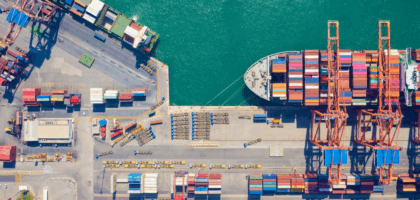On April 10, 2020, the Federal Emergency Management Agency (FEMA) published a directive halting the export of five types of personal protective equipment (PPE) from the United States without explicit approval. The directive was authorized by the President under the Defense Production Act (50 U.S.C 4511(a)) which gives him the authority to allocate materials, services, and facilities as he deems necessary or appropriate to promote the national defense.
On April 17 and April 23, 2020, FEMA published exemptions to the temporary final rule which allowed for the export—under certain circumstances—of PPE without prior approval.
Background
As of April 29, 2020, there were over one million confirmed cases of COVID-19 in the United States, resulting in over 60,000 deaths. At this time, there is no vaccine that can prevent infection, nor is there any FDA-approved post-exposure prophylaxis for people who may have been exposed to COVID-19. Treatment is currently limited to supportive (or palliative) care for patients who need it. In support of everyone exposed to the novel coronavirus at home, in their community, or in the course of their work, the President has exercised authority to limit the exports of:
- Surgical masks, which act as a barrier to fluids and particulates;
- N95 filtering facepiece respirators (including disposable particulate respirators);
- Other filtering facepiece respirators which offer protection from particulate materials at an N95 filtration efficiency;
- Elastomeric air-purifying respirators and their cartridges; and
- Surgical or exam gloves.
The administration has ruled that this measure is necessary because the domestic need for these materials exceeds the supply. In support of this resolution, the Export-Import Bank of the United States (EXIM) also temporarily excluded EXIM coverage or financing for any export of covered PPE through May 31, 2020.
Current Status
Exports will only be permitted under the following conditions:
- The exporter has had continuous orders for covered materials since January 1, 2020, which consisted of no more than 20% of their domestic production (3M Company).
- The exports are being shipped by non-profit or non-governmental organizations for donation to foreign charities for free distribution.
- The shipments are being sent to U.S. commonwealths and territories, including Guam, American Samoa, Puerto Rico, the U.S. Virgin Islands, and the Northern Marianas Islands.
- The intra-company transfers are performed by U.S. companies’ domestic facilities to affiliated foreign facilities.
- The materials exported are for assembly into medical kits destined for the United States.
- The movement of sealed, sterile kits where the covered materials are only a constituent.
- They are diplomatic shipments.
- The shipments are being transported to U.S. military addresses or embassies, or on behalf of the U.S. federal government.
- The shipments are in-transit through the United States en route to foreign destinations.
- The shipments are being exported to Canada or Mexico.
Under this temporary rule, before any shipments of such covered materials leave the United States, CBP will detain the shipment temporarily, during which FEMA will determine whether to direct it for domestic use or allow the export in part or in whole. A letter of attestation is required in order to export under a published exemption. The letter should be submitted through CBP’s document imaging system (DIS) with supporting documentation related to the export, and contain the following:
- A description of the type and quantity of covered materials;
- Which exemption the exporter is claiming;
- Any related information supporting that exemption;
- The expected end use of the exported materials; and
- A certification that the information contained is true and accurate to the best of the exporter’s knowledge.
Impact
This rule is in effect until August 10, 2020. Under this order, FEMA may purchase all (or part of) the shipment, redirect the shipment for domestic distribution, or allow the export to proceed as planned. FEMA has indicated that not every shipment of covered materials will be detained. Whether or not the freight is being exported under an exemption, the enforcement is focused on shipments valued at $2,500 or more and consisting of more than 10,000 units.
Resources:
- Prioritization and Allocation of Scarce Medical Resources (Federal Register)
- EXIM Board Resolution– April 14, 2020 (EXIM.gov)
- Implementation of Allocation Order on Exports of Scarce PPE (FEMA)



